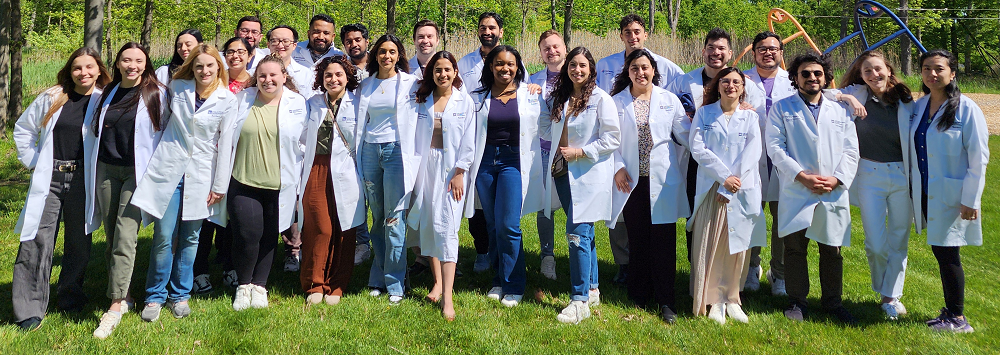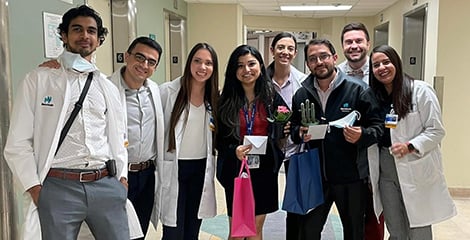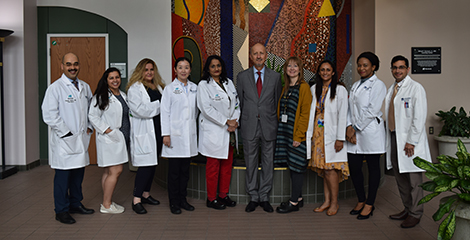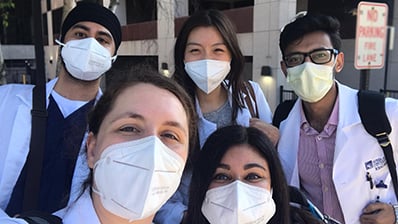Psychiatry Residency
The Psychiatry Residency Program at MetroHealth provides trainees with outstanding on-the-job training experiences, superb mentorship and individualized education plans that will lay the foundation for the rest of your career. We offer our residents a rewarding, enriching life that enhances your potential to become a skilled psychiatrist.

Highlights of our residency program include:
- Comprehensive training in a county hospital system with an integrated care model
- Clinical training in our state-of-the-art Behavioral Health Hospital and Psychiatric Emergency Department
- An indepth, robust Consultation-Liaison Psychiatry experience at the state-of-the-art MetroHealth Glick Center
- Vigorous and balanced biological and psychotherapy training
- Six (6) months of elective time during residency training to accomplish your academic and research goals
- Clear educational core values
- Our affiliation with Case Western Reserve University allows our Psychiatry residents to interact with a diverse group of faculty, resident trainees, medical students, and professionals from other healthcare systems.
- Globally diverse, friendly group of faculty and residents
- Comprehensive training with community-based psychiatry and psychotherapy along with the flexibility to rotate in multiple electives.
- Significant depth and level of expertise of faculty in most clinical and academic areas
- Inpatient/Outpatient Case Conference series: Throughout the academic year, PGY 1-3 residents will present interesting or challenging cases with their attending and discuss them in a multidisciplinary setting. This is followed by stimulating discussions on the various psychiatric concepts and treatment modalities related to the case.
Cultural Formulation Movie Club: The Psychiatry Program Director, Dr. Marwaha, selects movies that discuss or address significant psychological and cultural challenges or characteristics. After watching the movie together, residents have a discussion which eventually leads to the development of a thorough “cultural formulation” for some or all the main characters. - PRITE review: Residents take the PRITE, or the Psychiatry Residents In-Training Examination, every year. To make reviewing vital concepts and revising PRITE questions fun, attendings and residents prepare presentations, trivia activities, and use games like Jeopardy or Kahoot.
- Teaching: Every year, we host hundreds of medical students from Case Western Reserve University, Ohio University Heritage College of Osteopathic Medicine, Northeast Ohio Medical University and other medical schools across the country. These students rotate in our inpatient unit and on our psychiatry CL service. Residents provide lectures on pertinent psychiatric topics and are encouraged and expected to teach and learn with medical students throughout their rotations.
- Resident Wellness/Wellbeing: Didactics schedules include monthly wellbeing sessions that include games, icebreakers, ice cream socials, and other team-building activities. Residents also partake in process groups with a psychologist attending (not affiliated with program faculty) to discuss difficult cases, process transference and countertransference issues, and raise any concerns for burnout or fatigue.
- Cleveland!! There is an awesome food scene, beautiful parks, sports teams, museums, festivals, and many other things to do whether you are single or will be arriving with family.
We look forward to talking with you about how MetroHealth can assist you in achieving success in this important next stage of your career.
Aims
- To provide clinical training in a new, 112-bed state of the art Behavior Health Hospital offering care to individuals with psychiatric disorders across diverse cultures, demographic variables, and socioeconomic classes.
- To train psychiatrists within a diverse inner-city patient population that provides residents training in psychiatric illnesses most prevalent in an underserved community, complemented by clinics based in suburban satellites to experience mental health issues in a different demographic population.
- To develop psychiatrists with in-depth and robust experience in Emergency Psychiatry and Consultation-Liaison Psychiatry with MetroHealth being a Level 1 Trauma Center.
Comprehensive training of psychiatrists with community-based psychiatry and psychotherapy and flexibility with opportunities to rotate in multiple electives. - To foster professional growth in a multidisciplinary and inclusive setting with the latest, most innovative technology
Residency Resources
Find online resources and other tools to assist you during your residency.
Learn about psychiatry and specializations from the American Medical Association.
Search for residency programs in 11 specialties from Residency Explorer.
Find resources, research, residency and fellowship positions, and more from the American Psychiatric Association.
FREIDA is an Accreditation Council for Graduate Medical Education-accredited (ACGME) database for prospective residents. Search for a residency or fellowship from more than 11,000 programs – all accredited by the Accreditation Council for Graduate Medical Education (ACGME). Learn how to use FREIDA from American Medical Association experts.
Learn about residency programs in the U.S., ECFMG certification, and more.
Frequently Asked Questions
We accept applications through the ERAS program. We do not offer any positions outside of the NRMP match.
Yes, PGY-3 and PGY-4 residents who are in good academic standing as defined by the program are eligible to moonlight with the permission of the program director.
We encourage all qualified applicants to apply, regardless of year of graduation from medical school. We have had residents that have excelled coming from other specialties. However, large gaps in your medical training are problematic.
The application package must contain:
- MSPE or Dean's letter
- Medical school transcript
- National Board of Medical Examiners (NBME) transcript (USMLE Steps 1, 2 and 3, if available)
OR
National Board of Osteopathic Medical Examiners (NBOME) transcript (COMLEX Levels 1, 2 and 3, if available), or ECFMG transcript/certification - Personal statement
- Curriculum vitae
- 2 letters of recommendation (at least 1 should be from Psychiatry)
We accept applications from all qualified US and International graduates.
We sponsor both J1 and H1B visas.
We use EPIC for all of our medical records.
Cleveland is a great city to live in, having the pros of living in big metropolitan area with few cons. There are plenty of restaurants, parks, museums, festivals, and things to do around the city whether you are single or will be arriving with a family.
Cleveland is especially beautiful in the summer. Cost of living is very reasonable, traffic isn’t something we worry about. For more information, see Living in Cleveland.
Residents start taking day call on the inpatient units during their intern year, but do not start overnight calls until their PGY-2 and PGY-3 years. On average, residents have 3-4 overnight calls per month.
Residents receive 5 CME days per year. Residents are provided $750 per year for educational purposes including conferences, training materials, books, etc.
Yes. We strongly believe that teaching is an excellent tool for learning. All residents are encouraged to support and teach their colleagues, faculty, and medical students.
Residents have the opportunity to teach CWRU, NEOMED and Ohio University medical students who rotate on the units during their 3rd year clerkships and 4th year AIs/electives.
There is no cut-off score for application. To be ranked, applicants must have passed USMLE Steps 1 and 2 and/or COMLEX Levels 1 and 2.
IMG applicants must be ECFMG certified to qualify for an interview. Although no specific minimum passing score is required, applicants must submit their performance profiles of the USMLE for review, and scores, as well as number of attempts, are considered in ranking.
Approximately two-thirds of our graduates continue on to pursue fellowships. We are proud to share that our residents have been successful in obtaining excellent fellowship programs at many renowned institutions, including Mayo Clinic, NYU, Mount Sinai, Emory University, Yale University, UH, USC, Cleveland Clinic and many more.
We are well versed in providing telepsychiatry services to our three satellite emergency departments from the Psychiatric Emergency Department in Cleveland Heights. We have been providing telehealth services in our outpatient clinics since March 2020.



